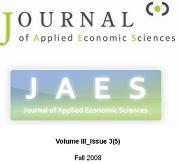ANALYSIS OF HIGH FREQUENCY DATA ON THE WARSAW STOCK EXCHANGE IN THE CONTEXT OF EFFICIENT MARKET HYPOTHESIS
ANALYSIS OF HIGH FREQUENCY DATA ON THE WARSAW STOCK EXCHANGE IN THE CONTEXT OF EFFICIENT MARKET HYPOTHESIS
Author(s): Pavel Strawinski, Robert ŚlepaczukSubject(s): Economy
Published by: RITHA Publishing
Keywords: effects; intra-day effects; the open jump effect; the end of session effect; emerging markets.
Summary/Abstract: This paper focuses on one of the heavily tested issue in the contemporary finance, i.e. efficient market hypothesis (EMH). However, we try to find the answers to some fundamental questions basing on the analysis of high frequency (HF) data from the Warsaw Stock Exchange (WSE). We estimate model on daily and 5-minute data for WIG20 index futures trying to verify daily and hourly effects. After implementing the base methodology for such testing, additionally we take into account the results of regression with weights, i.e. robust regression is used that assigns the higher weight the better behaved observations. Our results indicate that we observe the day of the week effect and hour of the day effect in polish data. What is more important is the existence of strong open jump effect for all days except Wednesday and positive day effect for Monday. Considering the hour of the day effect we observe positive, persistent and significant open jump effect and the end of session effect. Aforementioned results confirm our initial hypothesis that Polish stock market is not efficient in the information sense.
Journal: Journal of Applied Economic Sciences (JAES)
- Issue Year: III/2008
- Issue No: 03
- Page Range: 306-319
- Page Count: 14
- Language: English

